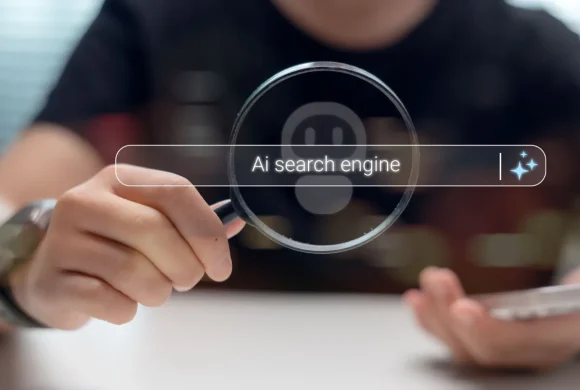Voice search and ChatGPT adapting your SEO for conversational queries

Are you using ChatGPT or other AI platforms and chatbots to search for information? I use more than one daily to research everything from recipes to wellness tips, holiday ideas, and business-related topics. Truth be told, I use it more than I use Google. For many of our clients, we have seen a noticeable shift in where their search results are coming from.
As discussed in previous articles on Deb’s Desk, Google is in a slow decline. It won’t disappear overnight, and it is still the most dominant search engine by a long way. However, search is changing, and adapting your SEO strategy is essential to your ongoing digital presence.
Now is the time to adapt your SEO to ensure your website can be found through voice and conversational queries. In this article, I provide a practical guide on optimising your website to meet the growing demand for voice and AI-assisted search.
“If your content doesn’t answer real questions, AI won’t pick you as the trusted source.”
Is voice search changing user behaviour
Yes, it is and quickly. As a marketing agency, the team and I spend much time studying and analysing consumer behaviour. We access a variety of digital tools that provide us with highly accurate data that we convert into a set of figures. These figures inform trends and shifts, which we use to pivot client strategies if required and future-proof when necessary.
Voice search is a trend and a shift that demands a pivot and a future-proofing strategy. Research tells us that people who have moved to voice search rarely return to traditional typed queries. They speak into their devices, using a conversational tone, and their questions tend to be longer.
“Can you please tell me who the most reputable financial advisor is on Sydney’s North Shore?”
They do this rather than typing shorthand keywords into a search engine.
These are called “natural-language” queries. They mirror how we talk, and more often than not, they have a localised theme. “Near Me” or a specific location “North Shore”, “North Sydney”
So, why does this matter?
Most AI tools like ChatGPT answer questions instead of providing a list of links that might. This is the biggest difference between AI bots and search engines such as Google. If your website content isn’t optimised to answer natural language questions, you may miss out on highly valuable and qualified leads.
These voice assistants pull answers to user questions from trusted sources already on the web and read them back out loud. I’m confident most people reading this article will have experienced this. The goal is to have your content picked up as the trusted source.
“People aren’t typing anymore—they’re talking. Your content should do the same.”
Actionable tips for SMEs to meet this new era of AI search
Websites need to adapt or, in some cases, overhaul their priorities to take advantage of voice-generated search. Below, I have listed actionable tips that we employ at Brilliant Digital.
- A significant shift is in the tone in which your content is written. It must be written by a human for a human. Using conversational language in your content that reads and sounds natural is critically important. Avoid stiff sentence structure or trying to be too high-brow, as it is a red flag for AI bots. Using keyword-stuffed text instead of phrases that customers would use will hurt your SEO. Content should read like a friendly conversation.
- Targeting long-tail keywords is a smart strategy. Think about how a customer will ask an AI assistant a question. For example, instead of targeting a broad term such as “Xero training expert,” target a question such as “Who provides the best training for Xero software in Melbourne?” While the longer-style queries will have a much lower search volume, they have a high success rate and qualify customers ready to make a decision.
- Adding a FAQ section to pages on your website is a non-negotiable. Identify relevant questions customers will ask about your services, products or experiences and answer them clearly, remembering to employ a friendly and conversational tone.
- AI bots love snippets. These are the highlighted boxes you see on Google and are highly coveted. Your content structure is critical to appear here: use clear headings and bullet points that answer questions and make the information easy to gather. Step-by-step guides are good and format them for easy consumption.
- Ensure your website loads fast and is mobile-friendly. The majority of voice-generated searches happen on a phone or tablet, and users are expecting lightning-fast responses. You must ensure your website is optimised for mobile viewing. Google employs mobile-first indexing. This means the mobile version of your website will influence your ranking, including voice searches.
- Schema markup is essential. This is a technical piece: code added to the backend that helps search engines better understand the context of your content. It will boost your compatibility with AI search features.
Be present and be consistent
You can overhaul your strategy as I have discussed here, but there is a but! It has never been a set-and-forget task. SMEs or any business must stay present and consistent to be visible. This means an ongoing quality content schedule and continued optimisation. Content should be regularly added to your site; however, adding content for content’s sake is not the answer. It must be human-centric, address customers’ needs, and answer questions. This is why data-driven analytics combined with critical thinking is so important. Secondly, your website must employ technical best practices. Speed, mobile user experience, and schema markup influence traditional and AI search.
Adapting to change is a primary function of any business and any unit within the business. It is part of growth. People are still searching; nowadays, they have different ways of doing it. The foundations of SEO remain solid, and the trends and shifts, while influential, are not barriers that are impossible to overcome. Aside from the technical aspects, AI search provides an opportunity to dig deeper into your business personality and communicate with your customers on a human level. Our job is to do just that and then optimise the personality to ensure traditional and AI engines see you as the source of truth.
“AI search is an opportunity to let your business personality shine online.”
Brilliant Digital puts the personality in digital marketing
The team at Brilliant Digital knows how to bridge traditional and AI search. People do business with people, and the middleman (the search engine) makes the introduction. This is our area of speciality. We know how to get the middleman to introduce the customer to your business.
Contact us today for an insightful discussion with our lead strategist, Deb Croucher.

About Deb
Meet the author
Deb Croucher is the founder of Brilliant Digital. She works directly with SME owners to create strategy-led, full-service marketing that delivers, not just in Google, but in the new world of AI-powered discovery.

Let’s Grow Your Business Together
Key Takeaways
FAQs
What is voice search and why should I care about it?
Voice search allows people to speak their queries out loud rather than typing them. It’s changing how customers find businesses online, and it’s here to stay. Understanding this shift is key if you want your website to keep showing up in results.
How is AI, like ChatGPT, changing the way people search?
People are asking longer, more natural questions like they’re having a chat with someone, instead of typing in short keywords. AI platforms are designed to understand and respond to these conversational queries; your website needs to be ready for that.
Will traditional SEO still work, or do I need to change my strategy?
Traditional SEO still matters, but it needs a refresh. Search behaviour has evolved, and your content has to keep up, especially if you want to be found through voice and AI searches.
What’s a “natural language query” and how do I use that in my content?
Natural language queries are full-sentence questions people ask, like “Where can I get the best bookkeeping support in Brisbane?” Your content should mirror these conversational questions and offer clear answers to rank well.
How can Brilliant Digital help optimise my website for AI and voice search?
We specialise in helping SMEs rewrite their website content so it speaks directly to voice assistants and AI tools. By using conversational language, answering common questions, and structuring your site for easy reading, we make sure your business stands out in this new search landscape.
Do I really need FAQs on my website now?
Absolutely. They’re more important than ever. AI platforms love pulling direct answers to specific questions. FAQs are the perfect place to do that. Plus, your customers appreciate getting quick, clear answers.
What’s the deal with long-tail keywords? Are they better now?
Yes! These are longer, more specific phrases people use in voice search. They might not have huge search volume, but they’re great at attracting high-quality leads who are ready to take action.
What if my website is slow or hard to use on phones?
That’s a problem for both traditional and AI search. Your site needs to load fast and look great on mobile. It’s something search engines check, and users expect. Brilliant Digital can run a full audit and get your site up to speed.
What’s schema markup, and do I need it?
It’s a bit of code behind the scenes that helps search engines understand your content better. Adding it makes your site more compatible with AI tools and can improve your visibility in search results.
Is this a one-time thing or do I need to keep updating my content?
SEO is not set-and-forget. To stay visible, your site needs regular updates with fresh, helpful content. That means staying on top of trends, answering new customer questions, and keeping your tech optimised.
Can Brilliant Digital help me overhaul my whole SEO strategy for the AI era?
Yes, that’s what we do best. From rewriting your content in a natural tone to making sure your website’s structure and tech are AI-friendly, we take a holistic approach so your business stays competitive in both traditional and AI-driven search.










